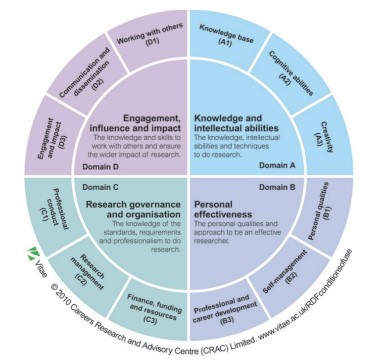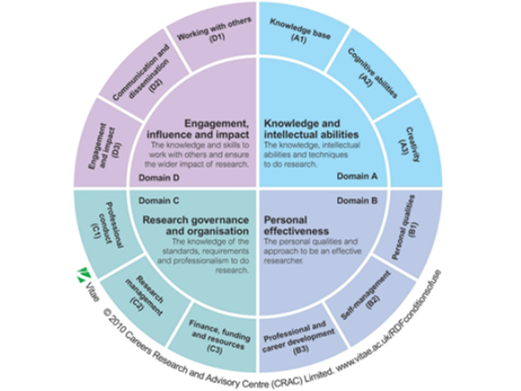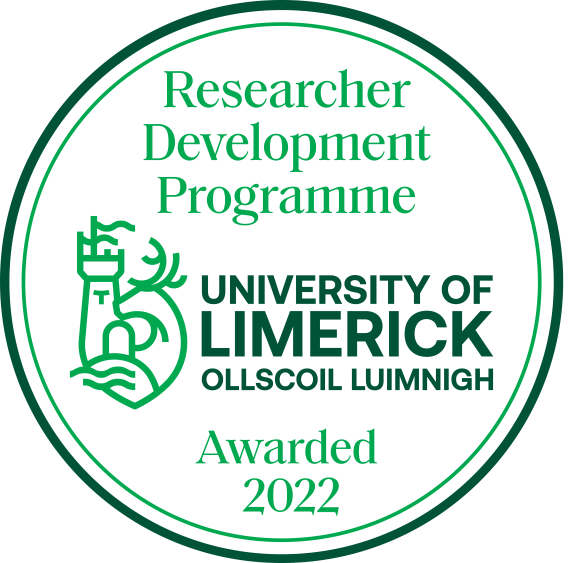
The UL Researcher Development Programme enables an individually tailored developmental journey. The aims of the programme are outlined here. The programme consists of a suite of training programmes and ‘lunch and learn’ sessions where you, as a researcher, can learn the skills that you need to excel on your research projects and forge your own successful career. On successful completion, you will receive your own unique digital badge, outlining all of the training received. This can be shared on your CV and social media to strengthen your professional profile. Watch Dr. Puneet Saidha, Director of Research Support Services speaking about UL Researcher Development Programme.
The Researcher Development Programme is informed and guided by the Vitae Researcher Development Framework (RDF) which has identified key areas as essential in building excellence within the research community. The framework is structured into four domains covering the knowledge, behaviours and attributes of researchers. It sets out the wide-ranging knowledge, intellectual abilities, techniques and professional standards expected to do research, as well as the personal qualities, knowledge and skills to work with others and ensure the wider impact of research. These are:
 |
Domain A: Knowledge and intellectual abilities. The knowledge, intellectual abilities and techniques to do research
Domain B: Personal effectiveness. The personal qualities and approach to be an effective researcher Domain C: Research governance and organization. Knowledge of the professional standards and requirements to do research Domain D: Engagement, influence and impact. The knowledge and skills to work with others to ensure the wider impact of research |
“The RDF is a professional development framework for planning, promoting and supporting the personal, professional and career development of researchers in higher education. It articulates the knowledge, behaviours and attributes of successful researchers and encourages them to realise their potential.” (Vitae, 2010)
3 steps to your Researcher Development Digital Badge:
|
|
|
Once all of the above is complete, portfolios are submitted to HR for review. Successful candidates will receive a digital badge which outlines all of the training received.
Courses and ‘Lunch and Learn’ Sessions will be advertised on UL Connect and on the Talent Development training schedule.
If a course is oversubscribed, you will be placed on a waiting list in case someone else drops out. We aim to run the most popular courses several times throughout the year, giving you the chance to attend at a later date.
Once you have booked on a course you are expected to attend, but if you are unable to do so you must cancel your place as there may be a waiting list.
The Researcher Development Programme is informed and guided by the Vitae Researcher Development Framework (RDF) which has identified key areas as essential in building excellence within the research community. The framework is structured into four domains covering the knowledge, behaviours and attributes of researchers. It sets out the wide-ranging knowledge, intellectual abilities, techniques and professional standards expected to do research, as well as the personal qualities, knowledge and skills to work with others and ensure the wider impact of research. These are:

Domain A: Knowledge and intellectual abilities. The knowledge, intellectual abilities and techniques to do research
Domain B: Personal effectiveness. The personal qualities and approach to be an effective researcher
Domain C: Research governance and organization. Knowledge of the professional standards and requirements to do research
Domain D: Engagement, influence and impact. The knowledge and skills to work with others to ensure the wider impact of research
“The RDF is a professional development framework for planning, promoting and supporting the personal, professional and career development of researchers in higher education. It articulates the knowledge, behaviours and attributes of successful researchers and encourages them to realise their potential.” (Vitae, 2010)
3 steps to your Researcher Development Digital Badge:

- Complete the Career Planner with your PI, including a skills assessment where you look at their strengths and weaknesses as a researcher.
- Choose 10 training sessions (1 credit per session). Most of these have a duration of half a day. You must also attend any of the 1 hour ‘lunch and learn sessions’ (3 sessions equals 1 credit)
- While on the programme you complete an e-portfolio which is a live document on the training you have attended and the impact it has had both personally and on your work as a researcher.
Once all of the above is complete, portfolios are submitted to HR for review. Successful candidates will receive a digital badge which outlines all of the training received.
Courses and ‘Lunch and Learn’ Sessions will be advertised on UL Connect and on the Talent Development training schedule.
If a course is oversubscribed, you will be placed on a waiting list in case someone else drops out. We aim to run the most popular courses several times throughout the year, giving you the chance to attend at a later date.
Once you have booked on a course you are expected to attend, but if you are unable to do so you must cancel your place as there may be a waiting list.
